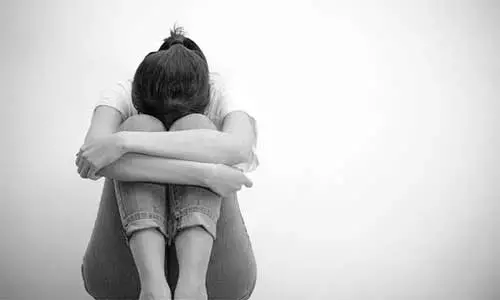- Home
- Medical news & Guidelines
- Anesthesiology
- Cardiology and CTVS
- Critical Care
- Dentistry
- Dermatology
- Diabetes and Endocrinology
- ENT
- Gastroenterology
- Medicine
- Nephrology
- Neurology
- Obstretics-Gynaecology
- Oncology
- Ophthalmology
- Orthopaedics
- Pediatrics-Neonatology
- Psychiatry
- Pulmonology
- Radiology
- Surgery
- Urology
- Laboratory Medicine
- Diet
- Nursing
- Paramedical
- Physiotherapy
- Health news
- Fact Check
- Bone Health Fact Check
- Brain Health Fact Check
- Cancer Related Fact Check
- Child Care Fact Check
- Dental and oral health fact check
- Diabetes and metabolic health fact check
- Diet and Nutrition Fact Check
- Eye and ENT Care Fact Check
- Fitness fact check
- Gut health fact check
- Heart health fact check
- Kidney health fact check
- Medical education fact check
- Men's health fact check
- Respiratory fact check
- Skin and hair care fact check
- Vaccine and Immunization fact check
- Women's health fact check
- AYUSH
- State News
- Andaman and Nicobar Islands
- Andhra Pradesh
- Arunachal Pradesh
- Assam
- Bihar
- Chandigarh
- Chattisgarh
- Dadra and Nagar Haveli
- Daman and Diu
- Delhi
- Goa
- Gujarat
- Haryana
- Himachal Pradesh
- Jammu & Kashmir
- Jharkhand
- Karnataka
- Kerala
- Ladakh
- Lakshadweep
- Madhya Pradesh
- Maharashtra
- Manipur
- Meghalaya
- Mizoram
- Nagaland
- Odisha
- Puducherry
- Punjab
- Rajasthan
- Sikkim
- Tamil Nadu
- Telangana
- Tripura
- Uttar Pradesh
- Uttrakhand
- West Bengal
- Medical Education
- Industry
Psychotherapy not as effective in children with depression, study finds

Psychotherapy along with antidepressants is an established mode of treatment inn adults.But its effectivity in young children has not been investigated
.In a systematic review and Meta-analysis researchers have found that Psychotherapy may be more effective for adults with depression than for children and adolescents.The new research has been published in JAMA Psychiatry.
In a review of research the international team of authors looked at data from 366 studies, with more than 36,000 participants, comparing depression symptoms in people undergoing cognitive behavioral therapy to those in people receiving other treatments.
Generally, those focusing on adults and older adults over age 24 found therapy was more beneficial for these age groups than it was for children, adolescents and young adults, the researchers report.
"The take-home message for people dealing with depression is that psychotherapies do not work as well in children and adolescents, compared to adults," co-author Dr. Pim Cuijpers, a professor of clinical, neuro and developmental psychology at the Vrije Universiteit in Amsterdam, told UPI.
"In general, though, psychotherapies are still very important and effective," he added.
Of the studies Cuijpers and his colleagues analyzed, 13 involved therapy in children age 13 and younger, 24 focused on adolescents between 13 and 18, 19 enrolled young adults between 18 and 24, 242 included middle-aged adults between 24 and 55, 58 featured older adults between 55 and 75, and 10 enrolled "older old adults" 75 years and older.
For each, researchers calculated an "effect size" by subtracting the mean depression score of the psychotherapy group from the mean depression score of the control group, divided by the pooled standard deviation and corrected for small sample bias. The overall effect size for psychotherapies across all age groups was 0.75, which is considered a large effect size and an indicator of the effectiveness of therapy for depression.
However, the effect sizes in the studies were much smaller for children, at 0.35, and adolescents, at 0.55, than in young adults, at 0.98, middle-aged adults, at 0.77, older adults, at 0.66, and in older old adults, at 0.97.
According to the authors, though, these findings "should be considered with caution" due to the suboptimal quality of most of the studies included in the analysis and the differences in how each of them were structured.
"I hope that our findings do not influence how patients manage their condition," Cuijpers said. "Treatments should be discussed (with) their clinician. Together, they should decide which treatment is best."
For more details click on the link: doi:10.1001/jamapsychiatry.2020.0164
Hina Zahid Joined Medical Dialogue in 2017 with a passion to work as a Reporter. She coordinates with various national and international journals and association and covers all the stories related to Medical guidelines, Medical Journals, rare medical surgeries as well as all the updates in the medical field. Email: editorial@medicaldialogues.in. Contact no. 011-43720751
Dr Kamal Kant Kohli-MBBS, DTCD- a chest specialist with more than 30 years of practice and a flair for writing clinical articles, Dr Kamal Kant Kohli joined Medical Dialogues as a Chief Editor of Medical News. Besides writing articles, as an editor, he proofreads and verifies all the medical content published on Medical Dialogues including those coming from journals, studies,medical conferences,guidelines etc. Email: drkohli@medicaldialogues.in. Contact no. 011-43720751


